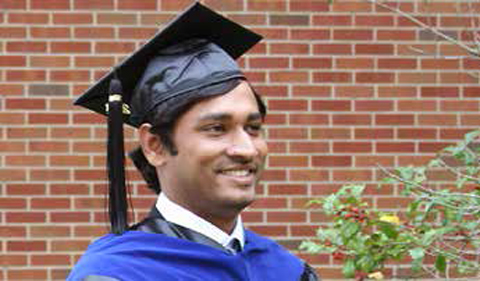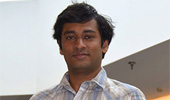Recent Physics & Astronomy graduate Rakitha Sanjeewa Beminiwattha ’13Ph.D. did his dissertation on “A Measurement of the Weak Charge of the Proton through Parity Violating Electron Scattering using the Qweak Apparatus: A 21% Result.”
His work on software development and data analysis for a major physics experiment conducted at the Thomas Jefferson National Accelerator Facility earned him the 2014 Jefferson Science Associates Thesis Prize.
His Ohio University adviser was Dr. Julie Roche, Associate Professor of Physics & Astronomy, and Beminiwattha’s work at in the Department of Physics & Astronomy was was supported by NSF Award #0969788 and was performed under the supervision of Roche and Dr. Paul King, Research Assistant Professor.
In His Words
“I have been involved in development and maintenance of Data analysis software and Data Acquisition (DAQ) system for an experiment called Qweak. Then I actively participated in the Qweak experiment data taking period. I also collaborated with Hall A experiments including HAPPEX, PREX and DVCS. Finally, I worked main data analysis project to obtain the main result, the weak charge of the proton by only using commissioning data set of the experiment. My dissertation was based on this initial release of results.
“I’d like to do research and development related to basic science for the next few years, to gain more experience in various aspects on nuclear experimental physics and then try to find a job in academia or in industry R&D. Currently, I’m involved in three future projects proposed to run in the Jefferson Lab. The first experiment is the parity violating asymmetry measurement of lead (Pb) to determine the neutron radius (PREX), which will run in about 2017. The second experiment is the proposed Solenoidal Large Intensity Device experiment (SoLID), which has a broad range of physics measurement capabilities. Third is the MOLLER experiment, which is a test of the Standard Model of Particle physics. The last two projects are very long-term project which will hopefully help me to find a job in academia.
“I had a very good experience as a grad student at OHIO even though it was very short. (I stayed only for about two years at Ohio University before moving to JLab.) During that two years, I learned a lot by interacting with the wonderful faculty at the Physics & Astronomy Department. They helped me to build a solid foundation in my research career. My advisers were really helpful on guiding me at early stages, and I learned to do work independently when I moved to the lab. I also have to mention the admin staff at OU physics was very good and helpful, especially when I moved to the lab and a lot of admin work had to be done over emails and telephone calls. They were helpful in every way.”




















Comments